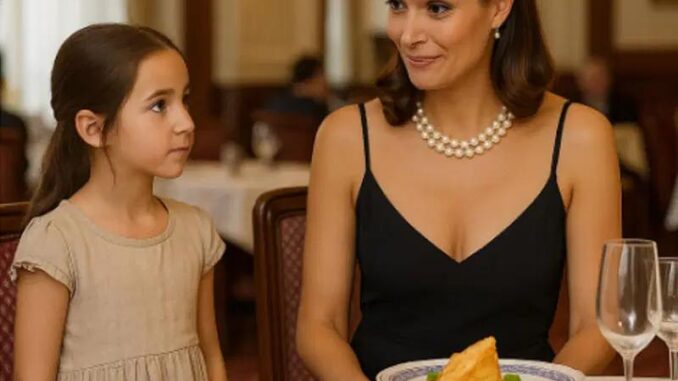
At a chic dining table, Carmen Vega—a 32‑year‑old Spanish fashion icon, owner of a couture empire, and holder of all worldly possessions except inner peace—was quietly enjoying her Iberian ham when her phone lit up. Across the drizzle‑wet street, a hunger‑haunted 10‑year‑old named Lucía, wearing torn, dirty clothes, stared inside. Gathering courage, Lucía entered and softly asked, “Ma’am, could I have what you’re not finishing?”
Carmen met her gaze. In that child’s eyes—full of pain and a spark of innocence—she recognized something lost within herself. Without hesitation, she moved her seat. “Sit beside me.”
Lucía ate, trembling between bites, as she shared how she’d lost her parents at eight, endured exploitation in foster care, fled abuse, and survived alone on the streets of Madrid. Carmen listened, tears welling: Lucía needed more than food—she needed care, dignity, and love.
Carmen whisked her to her Chamberí penthouse: a hot bath, clean clothes, a silk‑sheeted bed, and, most importantly, respect. That night, Lucía asked, “Why are you helping me?” Carmen couldn’t explain, only felt that at last she was doing something meaningful.
At 3 a.m., Lucía’s room was empty. A note read: “Thank you, but I don’t belong in this beautiful world. I don’t want to cause you problems.” Carmen panicked—searched the city, posted flyers, hired investigators. Five days later, she found Lucía under the arcades at Atocha, feverish and frail. Carmen cradled her: “I’ll never leave you again. You’re the most precious thing I know.”
Lucía was hospitalized with pneumonia. Carmen stayed at her side. When Lucía awoke and asked, “Did she stay here the whole time?” Carmen replied, “Where else could I be?” That’s when she decided to adopt Lucía. Tears of joy, and Lucía asked, “Can I have a mom again?” Carmen promised: “I’ll be the best mom in the world.”
Six months later, adoption finalized. Carmen founded the Lucía Vega Foundation for homeless children. Lucía attended private school, but her past haunted her. One day she sobbed: “A girl said I’m homeless. Maybe I don’t deserve this life.” Carmen knelt and said, “You’re not here because I bought you—you saved my life. Before you, I was rich but empty.”
On Lucía’s 13th birthday, Carmen pledged half her fortune—one billion euros—to the foundation. “True wealth isn’t money—it’s love. And I’ve received more love from you than I ever imagined.”
Three years on, now aged 14, Lucía serves as a foundation ambassador. At the 50th center’s opening she told cameras: “Every child we help is a life changed.” That evening, back at the same restaurant, Lucía ordered Iberian ham. “That night, fate brought us together—you needed me as much as I needed you.”
Then a frightened eight‑year‑old girl named Ana approached. “Could I have some of your bread?” Lucía seated her. “When did you last eat?” “Yesterday morning.” Lucía looked at Carmen, smiled, and ordered another plate: “Waiter, for our little guest.”
As Ana ate, Carmen realized the cycle was complete: kindness had become an inheritance. A simple question—“Could I have your leftovers?”—had sparked a family, a legacy, and fresh hope for many.